
NEUROSCIENCE
Addiction is a mental disease, and like most mental disorders, it originates from a biochemical imbalance in the brain. It develops when the brain’s natural production of dopamine becomes impaired, leading to a conditioned response to the effects of a substance. This dopamine deficiency creates feelings of dissatisfaction, lack of motivation, and emotional emptiness — sensations often mistaken for depression.
Cravings arise directly from this dopamine shortage and are often accompanied by irritability and anxiety. For this reason, individuals suffering from addiction frequently believe they have depression or an anxiety disorder, when in fact the true cause lies in a dysfunction of the dopaminergic neurotransmission system.
The therapeutic approach to addiction differs fundamentally from that of anxiety or depression. In addiction, the individual perceives reality through a negative lens, shaped by the cognitive coherence between their physical and emotional suffering. Everyday situations are interpreted as problems, generating discomfort and conflict with their surroundings.
The first goal in treatment is to restore healthy dopaminergic neurotransmission. This requires complete abstinence from the addictive substance. The recovery period for dopamine regulation varies from approximately three months to two years, depending on the individual.
The second goal is to restructure maladaptive behavioral patterns — the distorted beliefs, thoughts, and justifications that sustain substance use. These cognitive traps serve to minimize or rationalize addictive behavior and must be identified and dismantled for genuine recovery to occur.
The third goal is to develop the capacity to manage triggers and stimuli associated with substance use. Recovery becomes nearly impossible when one continues to engage in the same routines or environments tied to addiction, as the brain has conditioned these behaviors into an automatic survival mechanism. Since this is a deeply ingrained subconscious process, the most effective strategy is to avoid exposure to such stimuli altogether.
Finally, the fourth goal involves the recovery of the brain’s rational functions — particularly those responsible for willpower and decision-making. The objective is to shift from impulsive, emotionally driven behavior toward a rational, goal-oriented mode of functioning.
